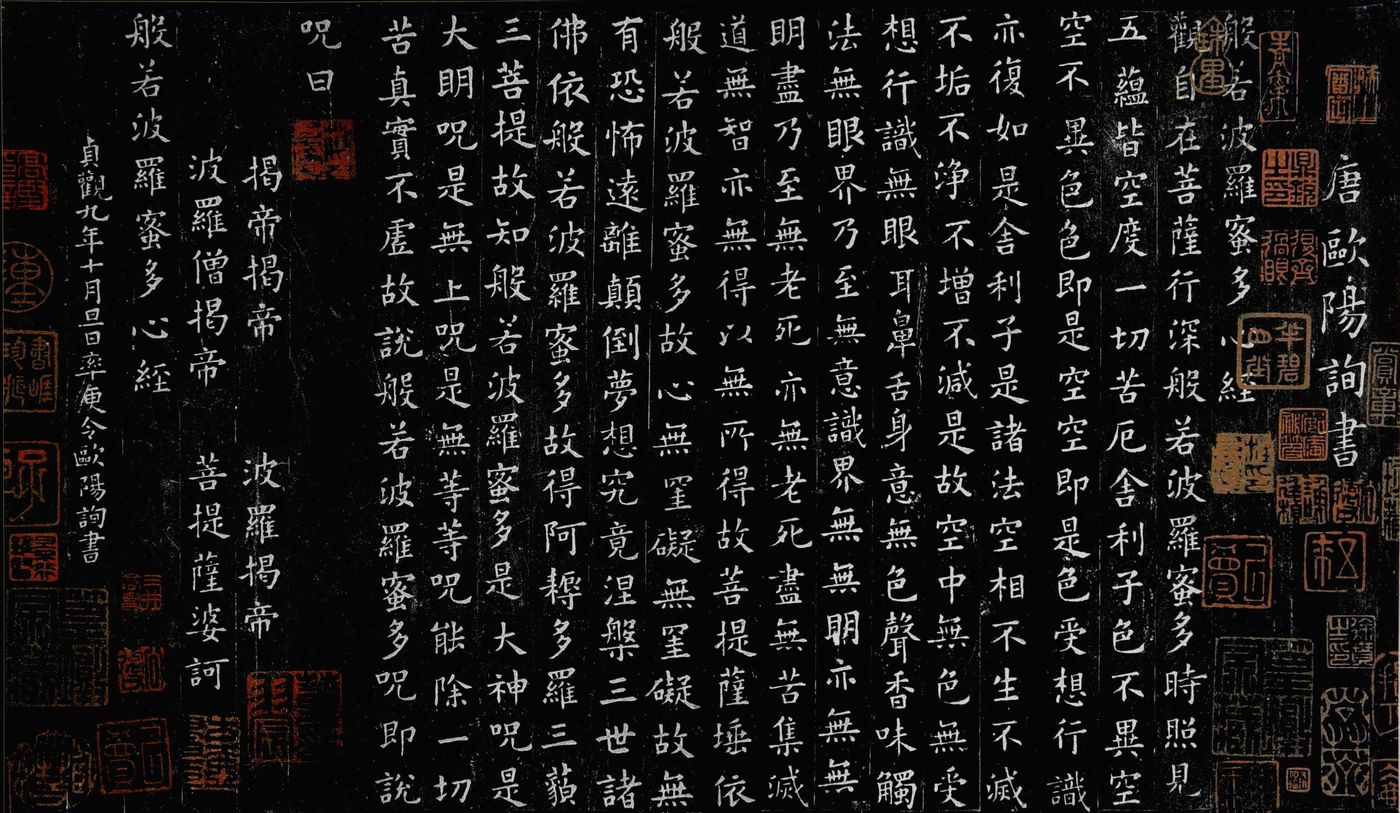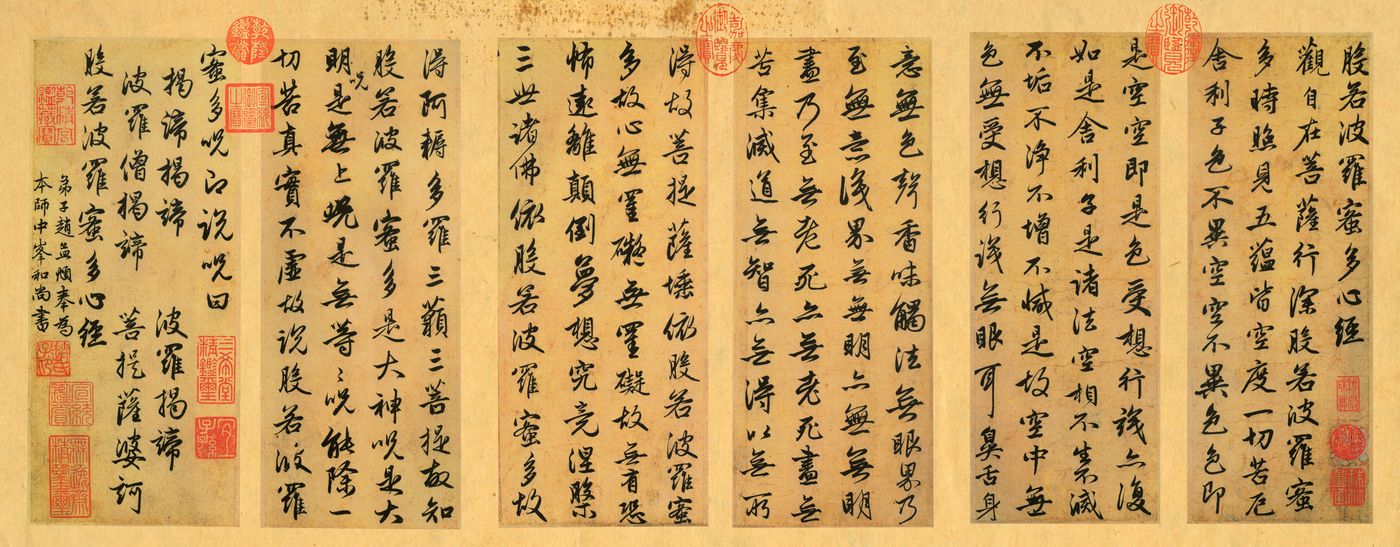"Reading the Sun" Podcast Preview: "The Heart Sutra" is actually a show
Hi!
The next "Reading the Day" podcast will meet you on January 4th. Let's talk about a Buddhist classic "Prajna Paramita Heart Sutra", referred to as "Heart Sutra". It wasn't a deliberate arrangement. When I came across this book in the first episode of the New Year's program, I half-jokingly thought that it was indeed "destined". After all, I am afraid that many people, like me, are most familiar with the "Heart Sutra". It is not like the voluminous Buddhist classics that make ordinary people who have no documentary foundation and religious experience be discouraged.

I would like to first state that I am not a Buddhist, and I will not speak about the Heart Sutra from the perspective of Buddhist believers discussing religious doctrines, nor do I have the qualifications to do so. What I hope to do is to try to interpret the Heart Sutra from the perspective of a modern reader, to see how it relates to our lives, and what method we should use. Open it and get new inspiration and help from it.
The last time we talked about Nietzsche's "The Use and Abuse of History", we repeatedly emphasized that we should understand history and culture, not by flipping through books, checking wikis, or listening to lectures, but by focusing on me and seeing it What does it have to do with me, whether I need it or not, and how to use it. This time the "Heart Sutra" is taught, we might as well consider it as a useful and interesting practice.
So, I want to apologize in advance to my friends who want to find or argue religious truth from this topic, because I am afraid it is not what this show can provide. We are by no means disrespectful to faith, but this program, we read the Heart Sutra not from the perspective of faith but from the perspective of ordinary people's lives, so if there is any language that is inappropriate or even slightly offensive, first Please forgive me here.
This episode does not intend to present a general meaning to you, nor does it intend to comment on any debate surrounding its meaning. I think that seeking a conclusion here may not be more important than everyone's finding its meaning for themselves. important. Because the Heart Sutra is a Buddhist scripture with the mission of preaching and propagating the Dharma, but at the same time it is also a classic for mankind: it is the most famous Buddhist scripture in the world, the most translated number and the most translated languages. All classics have a characteristic, that is, they transcend their original fields and become treasures shared by the human cultural world. Just as "A Dream of Red Mansions" is a Ming and Qing novel, but it is obviously more than a novel, and it is not only a Chinese literary wealth; the "Bible" is the teaching of Christianity, but it is not only a teaching, and it does not belong to a religious group. ; Shakespeare's plays are British plays, but not just plays, and not just parts of English literature. All classics are destined to be constantly re-understood, re-interpreted, and re-used to serve humanity.
This is also an important reason why I, as a complete "outsider", chose to speak about the Heart Sutra.
Reading it as a curious modern reader is a very interesting thing, seeing a lot of "unseen" and "rare" things, and harvesting a lot. In addition, there are of course triggers from personal life experiences. I think it is very necessary and interesting to share such personal experience with you, and I hope that this is a process of attracting others to talk about their unique personal experiences and feelings.
I've included the text with some relevant material at the end, and if you're interested, I suggest you browse the podcast before it goes live.
It's really flattering to see friends from Matters continue to subscribe to "reading the day" emails and write back to us! Although I haven't responded to them one by one, I have read each of them carefully, even several times. Thank you very much for your support and trust. It is a great pleasure to read together. I am also honored that some of the questions raised and discussions initiated by "Reading Liri" can contribute different perspectives to everyone and increase the joy of reading and even life.
I hope that in 2021, I will still be able to read with you on "Reading Day" and explore "the unknown unknown". If you want, please subscribe to "Reading Liri" , or help to share "Reading Liri" with your friends, this is a great support and encouragement to me and other members of the team! Thank you once again!
As always, feel free to write me back with a list of books you'd like to read and authors you'd like to learn more about. I hope "Reading Day" in 2021 can be your best partner.
See you on our next reading!
·
·
all the best,
Ambrosia
"The Heart Sutra of Prajna Paramita" (translated by Xuanzang, the master of Sanzang in Tang Dynasty)
Avalokitesvara Bodhisattva, when practicing deep prajna-paramita, sees that the five aggregates are empty, and saves all suffering. Sariputra, form is not different from emptiness, emptiness is not different from form; form is emptiness, and emptiness is form. Want to know that line, same is the case. Shariputra, the emptiness of all dharmas is neither arising nor perishing, neither defiled nor pure, neither increasing nor decreasing; therefore, the sky has no form, no feeling, thought, action, and consciousness; no eyes, ears, nose, tongue, body, or mind; There is no form, sound, smell, taste, touch, and dharma; there is no vision, even the world of unconsciousness; there is no ignorance, and there is no end of ignorance; even there is no old age and death, and no old age and death. There is no suffering, accumulation, cessation, and path, no wisdom and no gain, because there is no gain. Bodhisattva, because of Prajna Paramita, the mind has no shackles, no shackles, so there is no fear, far from upside-down dreams, and finally Nirvana. All the Buddhas of the three times, by virtue of Prajna Paramita, attained Anuttarasamyaksabodhi. Therefore, we know that Prajna Paramita is the great divine mantra, the great bright mantra, the unsurpassed mantra, and the unparalleled mantra. It can remove all suffering, and it is true and not false. Therefore, when the Prajna-Paramita mantra is said, the mantra is said: Jie, Jie, Para, Jie, Parasang, Bodhisattva.



Like my work? Don't forget to support and clap, let me know that you are with me on the road of creation. Keep this enthusiasm together!

- Author
- More